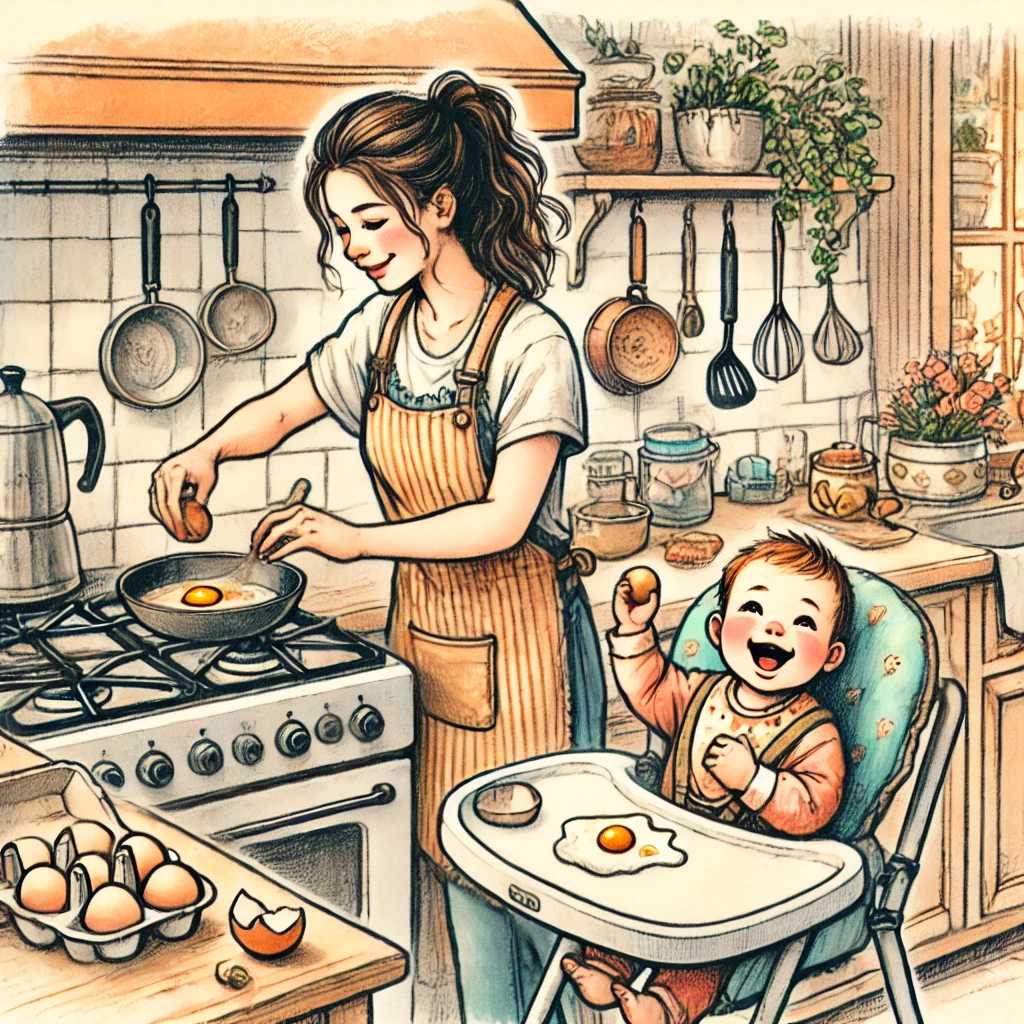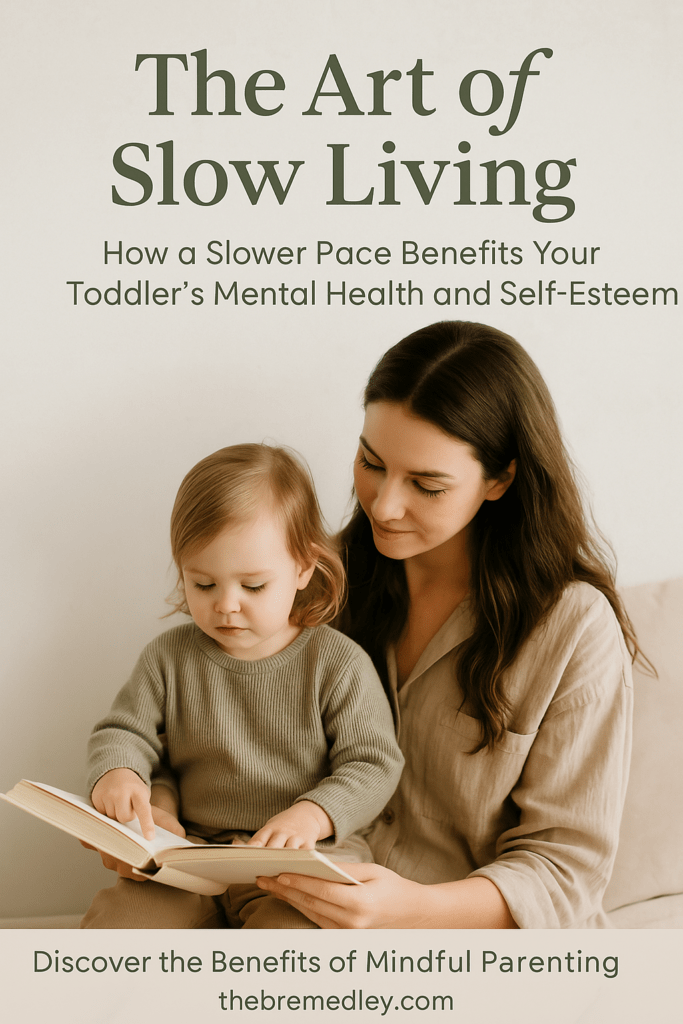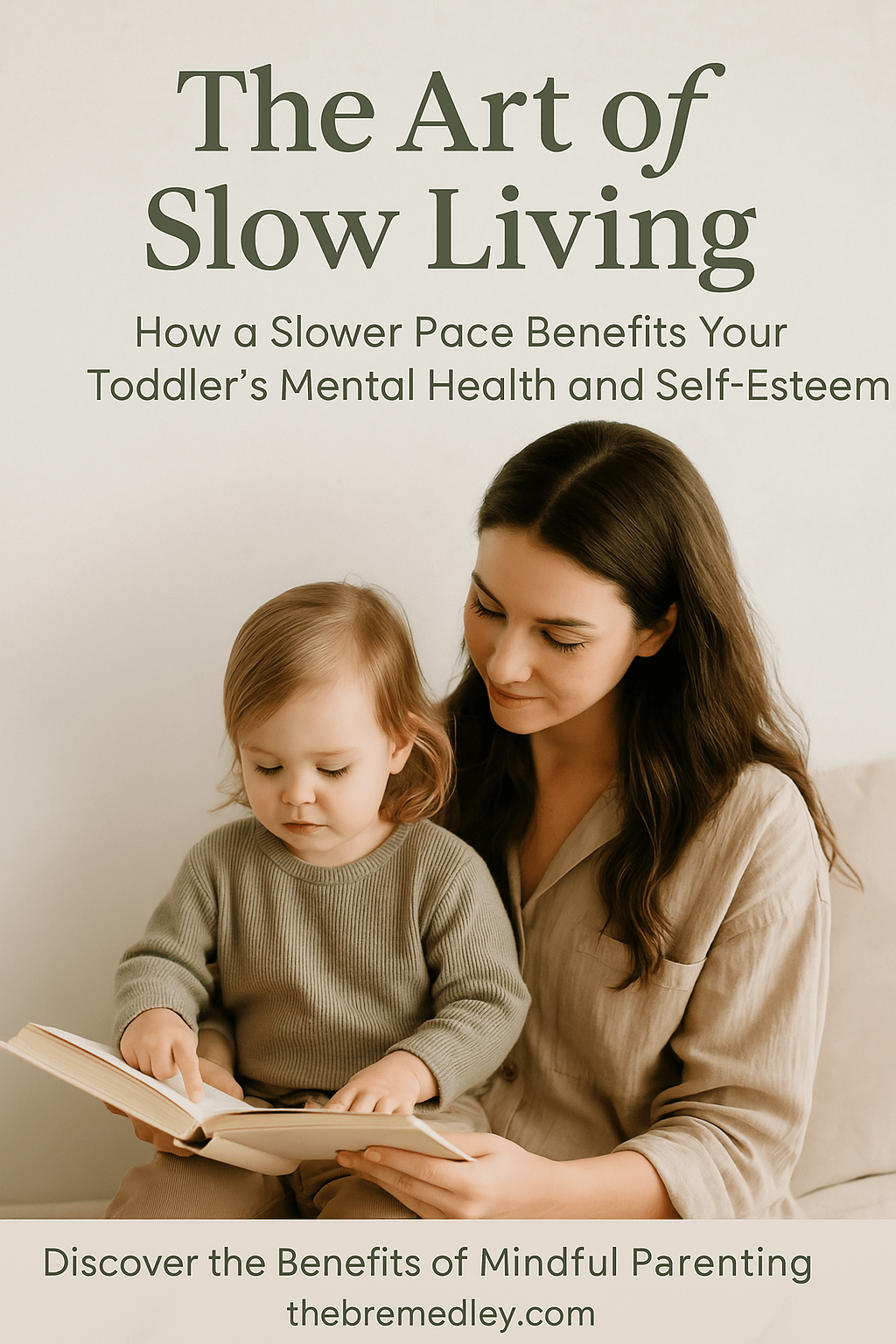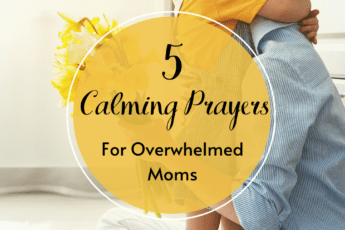
How a Slower Pace Benefits Your Toddler’s Mental Health and Self-Esteem
“Fast and Slow do more than just describe a rate of change. They are shorthand for ways of being, or philosophies of life. Fast is busy, controlling, aggressive, hurried, analytical, stressed, superficial, impatient, active, quantity-over-quality. Slow is the opposite: calm, careful, receptive, still, intuitive, unhurried, patient, reflective, quality-over-quantity. It is about making real and meaningful connections – with people, culture, work, food, everything. The paradox is that Slow does not always mean slow… It is also possible to do things quickly while maintaining a Slow frame of mind.” – Carl Honore, Author of “The Slow Fix”
I was up before my toddler. Five months pregnant at the time with my second, and getting myself ready for a networking event I went to every Tuesday morning at 8am. My life, at this time, revolved around growing my new business, which meant a whole lot of schmoozing and small talk. (Eww, I just barfed a little thinking about it.) I ran a magazine franchise in Central Texas that I had built by walking in or calling on every small business I could find, this type of work had me on the go everyday! So back to my Tuesday morning networking meeting – my little boy wakes up and see’s me rushing around the house collecting my things while trying to eat a bagel and fix my hair. “Mama, mama come cuddle me!” he says, in the most adorable 2 year old kind of way. My mind is fixated on making it to this networking event on time (after all I was paying to attend), I give him a long hug and kiss and let him know I’ll be home soon. On the drive, my heart breaks. I would much rather stay home, but, at the time, that was the lifestyle that my spouse and I had created for ourselves. Running my business was fun, it WAS an awesome way for me to manage my own time. But I found myself really wanting to get the option to NOT work…to give my self a long sabbatical, a ‘power pause’ of sorts. (You can actually read more on that here.) I really longed for a day when my little ones didn’t have to see me rush from meeting to meeting and juggling emails and client calls.

Our Fast-Paced World
Many mom’s I know have been suckered in to this fast-paced business or career driven world in an effort to find a form of significance, fulfillment or whatever else their heart desires. Those things aren’t wrong, but the reality is it often times comes at the cost of character and virtue development. Things like patience, peace, joy, kindness towards your spouse and kids go flying out the window. So slowing down, at the time, felt like an impossible task for me. Trying to remain present and calm with my toddler while feeling the stress of my daily tasks was very challenging. However, now that I am a year into my intentionally designed ‘slow-paced’ life, I am discovering the beauty and benefits of the “slow living” lifestyle, and I am in love with it’s deliciousness (that is the word that I think comes close to the feeling I get living this way!) Not only does this approach improve your own well-being, but from the studies I’ve read, it has a profound positive impact on toddlers, fostering better mental health, confidence, and resilience. So let’s get into it, shall we?
What Is Slow Living, and Why Should You Embrace It with Your Toddler?
I’m sure there are many different ways to describe what slow living is, because everyones pace of life is different, and what might be “slow” to me could feel actually pretty fast to others. So here is what I’ve found it to be. Slow living is about prioritizing quality over quantity, mindfulness over multitasking, and presence over productivity.
I also have found that slow living puts more emphasis on WHO you are becoming, OVER what you can achieve materialistically or monetarily. There is also another equally as important factor that I have observed, and that’s HOW you interact with those closest to you. Your tone of voice, your ability to give and receive grace, your patience and kindness to those closest to you. Obviously you can strive for improving yourself in these ways while achieving more, but I have found that the monetary focus should come second. Now at the time, I was the main provider for our family as my husband was focused on investing and building a house to sell as well as purchasing a home to rent. It took a good amount of time, but now that investment has paid off and allowed us to live a slower life, but back then I could not imagine NOT working. Making the decision to give up my business was hard. Whatever the situation is for you, it’s important to consider what exactly a slower pace of life means to you, and if part of that means making less money.
Your Toddler
So how does this decision to live a slower pace of life effect your little ones and your toddler? Well for toddlers, whose brains are developing fast, a slower pace of life allows them to process experiences better, explore their environments without feeling rushed, and to feel secure. They are able to do this because they have a mindful caregiver who is present and able to engage with them in a kind and patient way.
When my husband and I decided to switch roles in regards to who would be the main bread winner, it allowed to me to completely change my priorities. Before making the switch my brain was constantly thinking of ways to grow my business, outsource tasks, drive more sales, make my staff feel appreciated, and my clients feel like they are receiving a ton of value. By the end of my work day, it was so hard for me to think about how to make my home life “homey” or how my toddler was developing. So when I made the switch I eased into this new life and was able to see my home in a whole new way. I noticed subtle things about my toddlers personality that I just never saw before. I enjoyed slow mornings with him letting him crack eggs with me for breakfast, not caring how long it took. I went with the flow of each day, and involved my toddler in daily tasks without rushing. Everyday I would find ways for him to feel capable of helping with tasks like dishes and laundry, or created areas and projects where he could work on and feel confident doing so.
In fact, research from the Center on the Developing Child at Harvard University suggests that children who experience nurturing, attentive interactions develop stronger cognitive and emotional foundations, setting them up for lifelong resilience. To me this means a caretaker who is PRESENT, who isn’t distracted by their phone or emails, and isn’t tending to 5 other toddlers.
1. Building Self-Esteem through Shared Activities
Allowing your toddler to participate in daily chores or activities at a slower pace has incredible benefits:
- Promotes a Sense of Accomplishment: Involving your child in tasks, such as folding laundry or stirring ingredients, allows them to experience the joy of contributing.
- Boosts Confidence: According to the American Psychological Association, children build self-confidence when they feel their contributions are valued. Slow living allows your toddler to take their time and fully engage, reinforcing their belief in their own abilities.
2. Supporting Mental Health and Emotional Development
The structure and security that slow living provides can help prevent the anxiety that many children feel when they are hurried from task to task. Sometimes just getting out the door to a day care provider, or seeing you rush out the door can cause so much unnecessary anxiety for your little one, and can sometimes set an a hurried tone for the whole day.
- Reducing Anxiety: A study published in the Journal of Child Development found that young children in high-stress, fast-paced environments often show more signs of stress and anxiety. By giving your toddler time to adjust and absorb, you provide them a safe space to learn and explore without feeling pressured.
- Building Emotional Resilience: Psychologists suggest that children who experience “mindful moments” throughout the day develop better emotional regulation skills, learning to stay calm and focused even when challenges arise.
3. Encouraging Curiosity and Cognitive Development
When tasks are rushed, a child’s natural curiosity can be stifled. In a slower-paced environment, toddlers have more freedom to ask questions, explore their surroundings, and learn by doing.
- Enhancing Problem-Solving Skills: Research from Stanford University shows that when children are given more time for open-ended play and exploration, they develop stronger problem-solving skills. Simple activities, like sorting laundry by color or practicing pouring water, become meaningful learning experiences.
- Fostering Independence: Toddlers learn best through hands-on involvement. When you slow down and let them try new skills, they gain independence and a stronger sense of capability.
How to Start Slow Living with Your Toddler
So maybe you are reading this thinking YES, I would LOVE to slow down and live this way with my kids. Slow living with a toddler doesn’t mean restructuring your life overnight; it’s about making small adjustments that allow for a more relaxed routine. And hey, if reading this has drawn up some unpleasant feelings of mom-guilt – that is OKAY, guilt is a natural response that we SHOULDN’T ignore, it’s a call to change behavior and make steps in a better direction, I cringe at some of the advice I have heard over the years on how to manage “mom guilt”. I have found that sometimes it’s not about how much you have to do in a day, but the WAY in which you show up for your kids and your spouse. This post is not intended to shame in anyway, but if it ruffles your feathers, it just means there is something to take a deeper look at in your life.
- Set Aside Time for Unhurried Activities: Choose simple, everyday tasks like preparing meals or cleaning up toys. Let your toddler help, even if it means things take a bit longer. This requires practicing INTENTIONAL patience. Little reminders for yourself, that it’s okay, he/she is learning!
- Embrace Routine and Rituals: Toddlers thrive on routine, so include consistent, slow-paced activities in their day, such as bedtime stories or nature walks.
- Prioritize Mindfulness Over Efficiency: Focus on the process, not just the end goal. This lets your toddler immerse themselves in activities, learning and enjoying without pressure. It’s also so good for YOU, I think once I made that switch internally to enjoy the process versus a certain result, I was able to completely untether myself from results and just enjoy each day, no matter what it brought me.
Statistics on the Benefits of Slow Living with Toddlers
Here are some recent studies underline the importance of a slow approach to parenting:
- Self-Esteem Boost: Children aged 2-5 who engaged in “helper tasks” with parents showed a 20% increase in confidence levels, according to a 2021 study from the University of British Columbia.
- Mental Health: A study published in Pediatrics showed that 80% of parents noticed reduced stress levels in their children when engaging in slower-paced, mindful routines.
Conclusion
Here’s the deal. The art of slow living is not just a trendy lifestyle choice, but a nurturing approach to parenting and living that benefits both you and your child. By slowing down, you help your toddler develop strong self-esteem, emotional resilience, and a love for learning. Start small, you don’t have to go and quit your job or sell your business like I did to enjoy this lifestyle. Embrace unhurried moments, find ways to become more mindful and aware of your tone of voice, and to increase the sense of calm and patience you have towards others. Then, watch your toddler thrive in a world where you embrace patience and presence over speed!
I know there is probably so much more than can be said about this topic, as it’s a way of life that I am still very new to and growing in. I am curious to hear your thoughts! Share them in the comments 🙂
Read More!
- 10 Reasons Why You Need a Hobby – Plus 10 Great Hobby Ideas to Get You Started!
- 20 Spring-Time Inspired Mother’s Day Gifts!
- 5 Calming Prayers For Overwhelmed Moms
- Simple Spring Cleaning Guide For Busy Moms!
- The Best Stroller for Toddler and Newborn Baby!







Marv Markle
November 28, 2024 11:55 amThank You….
Living at a slower pace benefits everyone…
Sabrina
November 30, 2024 2:45 amExactly.It makes space for a more thoughtful way of being.
Shayla
December 19, 2024 7:09 amYou did a remarkable job with this blog. You helped with breaking down the details of a slow paced lifestyle. This opened up my mind to things I can put into practice once my little one starts reaching that age!
Sabrina
December 19, 2024 8:48 pmThank you! It was hard for me to really understand “slow Living”, since i’m naturally pretty “fast” in my way of doing things. I am still learning how to pause and be more present throughout the day. I think for me, I just decided one day, that I need to be better at the way I interact with the people in my life (like my tone of voice, kindness, patience, etc) and once I ‘slowed’ down, I was able to BE a little better…still trying LOL
Deni
December 24, 2024 1:01 amI so agree, and it’s refreshing to see that someone else lives this way, in this day and age of rushing around, trying to “have it all” and really ending up with nothing. I see so many people trying to do it all, and not doing any of it WELL! My husband and I decided about 30 years ago to simplify our lives and live this way, and it has been the key to a much greater life. I applaud you for doing this, and encourage more young people to do the same.
Jordan Palmer
February 23, 2025 1:16 pmLoved this post! Such a great reminder as I also have a 2-year-old, trying to run my own business but be a stay-at-home mom. It’s hard to find the balance and this post really helped!
Cassie
February 27, 2025 2:44 amWhat a delightful read! I too have felt the call of a slow paced lifestyle and in my opinion it is one of the most fulfilling and rich lifestyles there is!
I love the point of “slow
Living puts more emphasis on WHO you are becoming, OVER what you can achieve materialistically or monetarily.” Because who wants more stuff when we can have more moments with the ones we love?!
Great read and really enjoyed it!
Sabrina
February 27, 2025 2:45 amThank you Cassie!!
Olga
February 27, 2025 5:53 pmWhat a great article! My youngest son is already 4yo but goes to pre-k only 3 times a week for three hours. I try to spend more time with him but also give him opportunities to find friends.
Courtney
February 27, 2025 7:24 pmI love this! I have made it a priority not to rush my kids. I try to let them put their shoes on, let them help buckle themselves in, or let them help with chores. It may take a little longer, but I love seeing the smiles on their faces when they happily say “I did it!” Slow living is so important to me as a mom!